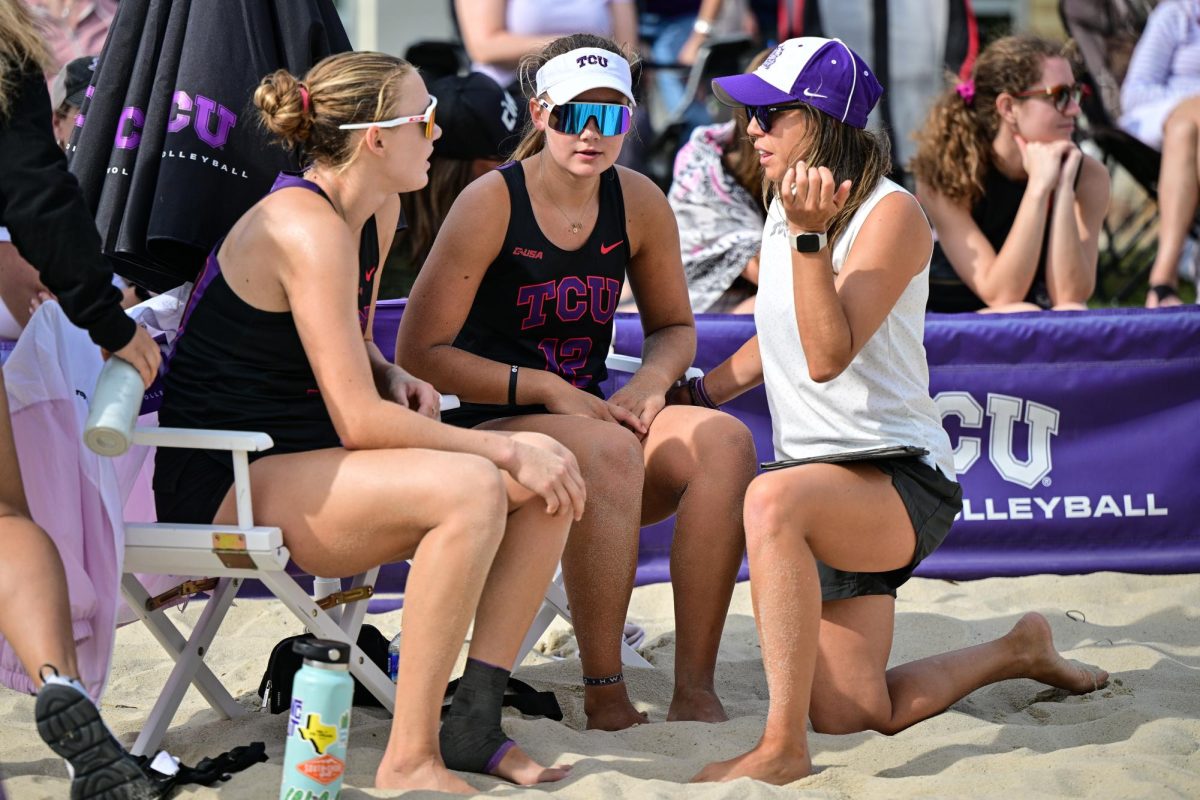The sound of hooves echoed throughout the barn at Turning Point Ranch in Springtown, Texas. Sporting boots and spurs, the riders of TCU’s equestrian team were busy practicing patterns on their horses in the arena, scrubbing horses down in the barn’s wash bays and polishing their riding gear all in preparation for the weekendʼs back to back home events against Kansas State and Auburn, the last home meets of the 2012-2013 season.
Although they have not been a part of the TCU family for long in comparison to the university’s other sporting teams, the Women’s Equestrian team has appeared in the National Collegiate Equestrian Association national competition every season since first founded in 2006, according to the team's official website.
The Equestrian team competes in both Western and Hunt Seat. Western competition is divided into Reining and Horsemanship while Hunt Seat consists of equitation over fences and flats, according to the team's official website.
In 2008, the Western team won the Varsity Equestrian Western National Championship, becoming the first team in Varsity Equestrian history to earn a national title in just its second year in competition, according to the team's official website.
The Western team finished out the 2009 season with Reserve National Championship accolades and in 2010 program history was made when the team placed fourth overall in Varsity Equestrian National Championships, the highest placing for the Horned Frogs at nationals, according to the team's official website.
In the current 2012-2013 season, the team is ranked third in the Big 12 and seventh in the NCEA. As with every season, the goal this year is to win a national championship, and since the transition into the Big 12 conference, the team has also been focused on winning a Big 12 Championship, Western head coach Kindel Walter, said.
Hunt Seat head coach Logan Florentino said: “In order to reach these goals, there are stepping stone goals along the way. These include consistency in rides, improving every week and taking meets one at a time.”
With Big 12 Championships in Stillwater, Okla., on the horizon (March 29-30), Walter said her goal for the season is to “have our team ride at the highest level of competition.”
“I push each girl on a daily basis to be the best they can be. Right now we are focusing on Big 12 wins,” she said.
Haley Jacobi, a senior hunt seat rider, said riding in the conference has changed many riders outlook on competition.
“The team has been more focused since entering the conference,” she said, “because we see the same teams multiple times, we have the opportunity to learn from each ride and see their style of riding and then we can improve on competing against that team versus having to focus on so many different teams across the country.”
Coach Walter agrees that the transition into the Big 12 has had a positive impact on the team.
“I really like the consistency of our schedule. Also, the teams we compete against are very successful, which pushes us to the highest level." she said.
While the riding performances may look undemanding or in some cases leisurely to the untrained eye, each event is carefully observed by a team of judges who score the rider's performance based on the following criteria as defined by the official website of the NCEA which outlines specifics for judging each event.
Riders competing in Reining perform a pre-selected American Quarter Horse Association or National Reining Horse Association pattern and are judged on their ability to guide and control the horse with ease through a series of speed controls, circles, lead changes, stops, back, rollbacks and precise spins. (NCEA website)
In Horsemanship, riders are judged on their ability to maneuver their horse through a predetermined pattern that consists of seven to nine maneuvers (including but are not limited to walk, jog, trot, lope and extension of these–gaits, pivots, lead changes, counter canter and no stirrups) while maintaining a balanced, functional and fundamentally correct body position. Judges are looking for horses and riders to work in unison and complete the maneuvers with subtle aids and cues. (NCEA website)
Equitation over fences and flats riders are judged on their ability to work as one with the horse while maintaining a correct riding position. Flats competitors perform a pattern which consists of nine maneuvers (which may include extended trot, no stirrups work, halt, back and lateral work). Riders in fences must complete eight to ten jumps at a height of 3 feet and 3 feet 6 inches. They are judged on their ability to position the horse correctly and not interfere with its balance for a smooth, polished jump. (NCEA website)
Riders in all events are typically given the pattern they will be performing a week in advance. In NCEA competition, horses are provided by the host school and are randomly assigned to the riders in each team’s line-up. To ensure some level of fairness, the riders on both teams compete on the same horses, and the visiting team is given a limited amount of time to practice on the horses they are assigned. Therefore, it is important that riders are comfortable riding a variety of horses, Courtney Motz, junior hunt seat rider and English team captain, said.
Different from other sports, equestrian requires a whole new level of commitment and dedication because these student athletes not only have to keep themselves fit and ready for competition but also their half-ton, four-legged counterparts.
In addition to the 42 riders, the university Equestrian team also consist of 35 horses, all of which have been donated by supporters of the program, Fiorentino said.
While in the saddle, riders condition their horses through strengthening exercises and prepare them for competition by rehearsing a variety of maneuvers and patterns, Motz said.
Outside the arena, coaches said they expect riders to see to the overall care of the horses.
“They are required to wash and groom the horses and are responsible for making sure the horse is in good health, as well,” Walter said.
Riders also groom and tack their horses before practices and shows said Fiorentino.
“They take this responsibility very seriously and they take a lot of pride in how the horses look and perform on game day,” Fiorentino said.
Many riders said their favorite part of being on the team is the support system they find in their teammates and they look forward to seeing their horses every day.
“Seeing the horses is my favorite part about coming into the farm," Jacobi said. “It’s a nice way to get away from all the commotion of school, campus, homework, and tests and it’s just the best way to clear my mind.”
With the start of the 2012-2013 season, the university equestrian team has found a new home at Turning Point Ranch, which sits on 30 acres in Springtown, Texas. The property is about a 45 minute drive from the university's campus and is managed by AQHA Professional Horseman Chuck Briggs, according to the team's official website.
“The facility has 36 stalls and a ton of pasture space for our horses. There are two covered arenas and one outdoor arena available for the team to use for training and competitions. We also have the use of a club house which we put to use on game days,” Fiorentino said.
Between the numerous hours in the saddle and spent caring for horses, the barn and rolling hills of Turning Point Ranch have become a second home for many riders on the team.
“The athletes ride three to four times a week and then additional practice times may be scheduled before meets,” Fiorentino said.
Jacobi said that in the middle of competition season she typically goes out to the farm five days a week and is there for three to four hours a day.
In addition to the hours put in at Turning Point, the student athletes also have academic responsibilities such as required hours in study hall, and they also attend four morning workouts a week with the TCU Athletics strength and conditioning staff.
“Most people don't realize how strong you have to be to ride a horse," Fiorentino said. "We focus a lot on cardio fitness and core strength.”
Team members also participate in the annual Roundup for Autism Parade held in the Fort Worth Stockyards and volunteer at the All-Star Equitherapy Foundation that provides therapeutic horseback riding, according to the team's official website.
Riders on the team have come from all over the country and most said they competed at the high school level.
“Most of our team has been selected through the recruiting process where we look at show records and horse experience. We do hold try outs at the start of each fall semester and usually invite two to four walk-ons to join the team," Fiorentino said.
Inside the clubhouse, riders gather around a mirror on the wall adjusting their hats, collars and buns while others dabb on makeup to cover up the sweat and dirt that comes with an early morning in the barn. It is gameday. The reins of program are literally in the hands of the riders.
In addition to winning conference and national titles, Fiorentino said her goals for the future also include "hitting a 3.25 GPA for the year and giving 300 hours of community service back to TCU and the Fort Worth area."
"I would also like to see the program really grow into a nationally recognized powerhouse program,” she added.






